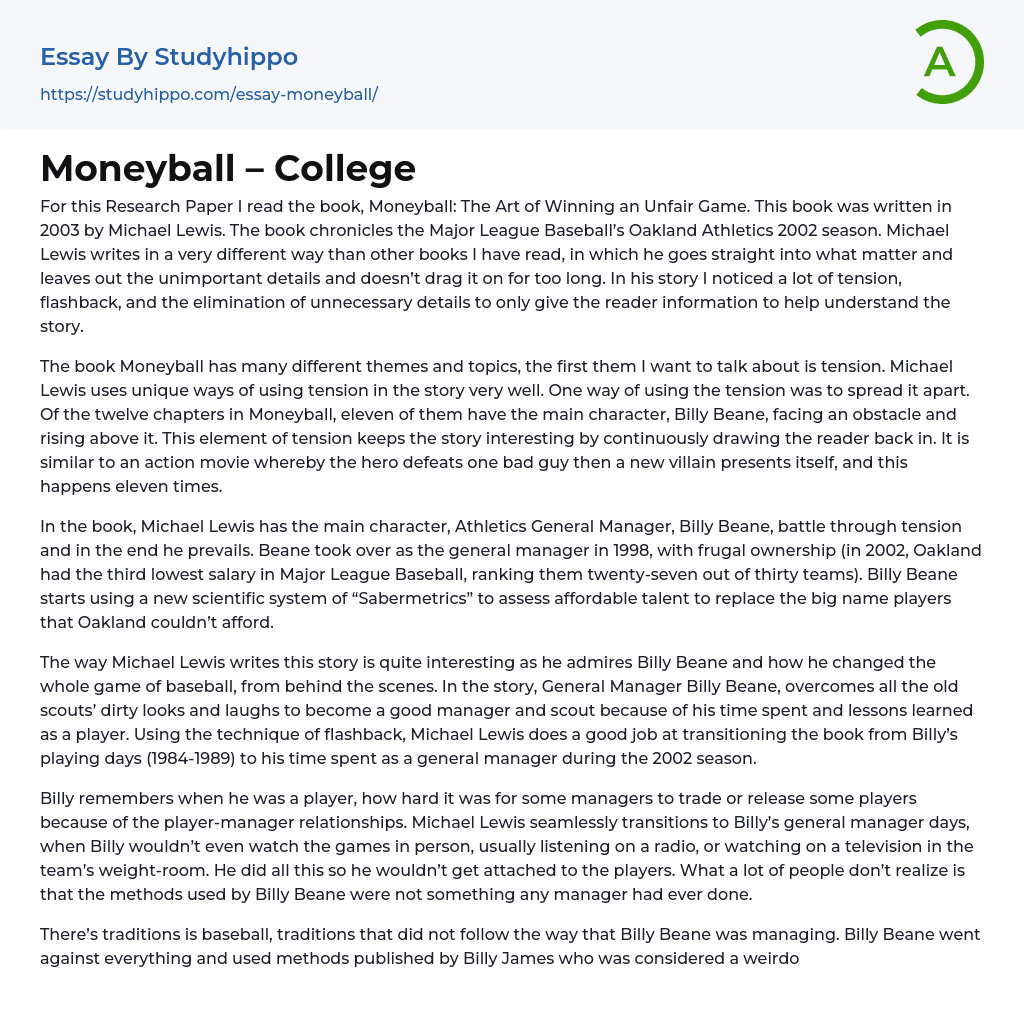In 2003, Michael Lewis wrote the book Moneyball: The Art of Winning an Unfair Game, which I read for this Research Paper.
The book Moneyball by Michael Lewis documents the 2002 season of the Oakland Athletics in Major League Baseball. Unlike other books I have read, Lewis has a distinctive writing style where he immediately gets to the heart of the matter and excludes any irrelevant details, keeping the narrative concise. Throughout the story, I observed a significant amount of tension, flashbacks, and the deliberate omission of unnecessary information, all aimed at providing the reader with relevant insights to comprehend the story. Moneyball covers various themes and subjects, and one notable theme is tension. Lewis effectively employs unique techniques to build tension in his narrative. One approach he uses is strategically spacing out moments of tension.
In Moneyball, the main c
...haracter Billy Beane faces and overcomes obstacles in eleven of the twelve chapters. This creates tension and keeps the reader engaged, similar to an action movie where the hero defeats multiple villains. Michael Lewis portrays Athletics General Manager Billy Beane battling through tension and ultimately succeeding. When Beane became general manager in 1998, Oakland had a frugal ownership, leading them to have the third lowest salary in Major League Baseball in 2002, ranking twenty-seven out of thirty teams.
The text discusses how Billy Beane adopts a new scientific system called "Sabermetrics" to evaluate affordable talent for the Oakland team. Michael Lewis's storytelling style admirably depicts Beane's transformation as he revolutionizes the game of baseball from his lesser-known role. Despite facing skepticism from traditional scouts, Beane proves himself as a skilled manager and scout due to his
experiences and learnings as a former player. Lewis effectively uses flashbacks to seamlessly shift the narrative between Beane's playing days (1984-1989) and his tenure as a general manager in 2002.
Billy recalls his days as a player and how some managers struggled to trade or release players due to the player-manager relationships. Michael Lewis then smoothly transitions to Billy's time as a general manager. During this period, Billy purposely avoided watching games in person and instead preferred listening on the radio or watching on a TV in the team's weight-room. This was his way of preventing himself from becoming too attached to the players. What many fail to realize is that Billy Beane's methods were unlike anything any manager had ever done before. Baseball had its own set of traditions, which did not align with how Billy Beane approached managing. He defied convention by adopting the methodologies advocated by Billy James, who was considered an oddball for his unconventional books. It was this willingness to go against the traditional grain that made Billy Beane truly remarkable.
Despite the absence of certain characters from the book, Michael Lewis's work is viewed positively by me. After being inspired to read his book following my viewing of Moneyball, I noticed that some characters appeared in the film but were not included in the book. However, these characters did not contribute to the plot of the book; instead, their presence added depth to the movie. In contrast, Billy and two other scouts were the primary focus of the book, with many other scouts involved in player rating before the 2002 baseball draft being excluded. Throughout my reading experience, every piece of
information presented was essential for constructing a comprehensive understanding of events without any distractions. Michael Lewis's adeptness at eliminating unnecessary details while maintaining an engrossing narrative enhances the quality of his writing.
The Story is captivating since most reviews express that you don't need any knowledge on baseball, yet it remains a compelling read. In my opinion, Michael Lewis' approach can be summarized as an effective way to maintain reader engagement and satisfaction, without letting the story become tedious. The three primary techniques I extracted from the story, namely tension, flashback, and omitting unnecessary details, are all valuable aspects to incorporate into my own storytelling and writing. This task was pleasurable as it allowed me to delve into a story that I thoroughly enjoyed and acquire new writing techniques that will undoubtedly benefit me in the future.
- Bank essays
- Banking essays
- Corporate Finance essays
- Credit Card essays
- Currency essays
- Debt essays
- Donation essays
- Enron Scandal essays
- Equity essays
- Financial Accounting essays
- Financial Crisis essays
- Financial News essays
- Financial Ratios essays
- Financial Services essays
- Forecasting essays
- Foreign Exchange Market essays
- Free Market essays
- Gold essays
- Investment essays
- Legacy essays
- Loan essays
- Market Segmentation essays
- Money essays
- Personal finance essays
- Purchasing essays
- Retirement essays
- Shareholder essays
- Stock Market essays
- Supply And Demand essays
- Venture Capital essays




